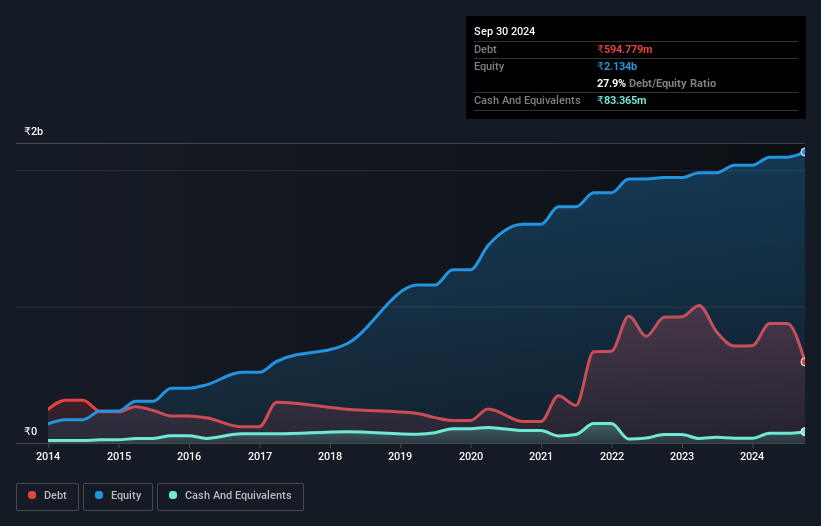These 4 Measures Indicate That DMCC Speciality Chemicals (NSE:DMCC) Is Using Debt Reasonably Well

Legendary fund manager Li Lu (who Charlie Munger backed) once said, 'The biggest investment risk is not the volatility of prices, but whether you will suffer a permanent loss of capital.' So it might be obvious that you need to consider debt, when you think about how risky any given stock is, because too much debt can sink a company. We can see that DMCC Speciality Chemicals Limited (NSE:DMCC) does use debt in its business. But the real question is whether this debt is making the company risky.
When Is Debt A Problem?
Debt assists a business until the business has trouble paying it off, either with new capital or with free cash flow. If things get really bad, the lenders can take control of the business. While that is not too common, we often do see indebted companies permanently diluting shareholders because lenders force them to raise capital at a distressed price. Of course, the upside of debt is that it often represents cheap capital, especially when it replaces dilution in a company with the ability to reinvest at high rates of return. The first thing to do when considering how much debt a business uses is to look at its cash and debt together.
See our latest analysis for DMCC Speciality Chemicals
What Is DMCC Speciality Chemicals's Net Debt?
The image below, which you can click on for greater detail, shows that DMCC Speciality Chemicals had debt of ₹594.8m at the end of September 2024, a reduction from ₹711.1m over a year. However, it also had ₹83.4m in cash, and so its net debt is ₹511.4m.

How Strong Is DMCC Speciality Chemicals' Balance Sheet?
Zooming in on the latest balance sheet data, we can see that DMCC Speciality Chemicals had liabilities of ₹1.20b due within 12 months and liabilities of ₹558.8m due beyond that. On the other hand, it had cash of ₹83.4m and ₹582.1m worth of receivables due within a year. So its liabilities outweigh the sum of its cash and (near-term) receivables by ₹1.09b.
Of course, DMCC Speciality Chemicals has a market capitalization of ₹8.19b, so these liabilities are probably manageable. But there are sufficient liabilities that we would certainly recommend shareholders continue to monitor the balance sheet, going forward.
In order to size up a company's debt relative to its earnings, we calculate its net debt divided by its earnings before interest, tax, depreciation, and amortization (EBITDA) and its earnings before interest and tax (EBIT) divided by its interest expense (its interest cover). This way, we consider both the absolute quantum of the debt, as well as the interest rates paid on it.
Given net debt is only 1.3 times EBITDA, it is initially surprising to see that DMCC Speciality Chemicals's EBIT has low interest coverage of 1.9 times. So while we're not necessarily alarmed we think that its debt is far from trivial. DMCC Speciality Chemicals grew its EBIT by 6.4% in the last year. That's far from incredible but it is a good thing, when it comes to paying off debt. There's no doubt that we learn most about debt from the balance sheet. But it is DMCC Speciality Chemicals's earnings that will influence how the balance sheet holds up in the future. So if you're keen to discover more about its earnings, it might be worth checking out this graph of its long term earnings trend.
Finally, while the tax-man may adore accounting profits, lenders only accept cold hard cash. So we always check how much of that EBIT is translated into free cash flow. In the last three years, DMCC Speciality Chemicals's free cash flow amounted to 46% of its EBIT, less than we'd expect. That weak cash conversion makes it more difficult to handle indebtedness.
Our View
Based on what we've seen DMCC Speciality Chemicals is not finding it easy, given its interest cover, but the other factors we considered give us cause to be optimistic. In particular, we thought its net debt to EBITDA was a positive. Looking at all this data makes us feel a little cautious about DMCC Speciality Chemicals's debt levels. While debt does have its upside in higher potential returns, we think shareholders should definitely consider how debt levels might make the stock more risky. There's no doubt that we learn most about debt from the balance sheet. But ultimately, every company can contain risks that exist outside of the balance sheet. For example, we've discovered 4 warning signs for DMCC Speciality Chemicals (1 is significant!) that you should be aware of before investing here.
Of course, if you're the type of investor who prefers buying stocks without the burden of debt, then don't hesitate to discover our exclusive list of net cash growth stocks, today.
If you're looking to trade DMCC Speciality Chemicals, open an account with the lowest-cost platform trusted by professionals, Interactive Brokers.
With clients in over 200 countries and territories, and access to 160 markets, IBKR lets you trade stocks, options, futures, forex, bonds and funds from a single integrated account.
Enjoy no hidden fees, no account minimums, and FX conversion rates as low as 0.03%, far better than what most brokers offer.
Sponsored ContentNew: Manage All Your Stock Portfolios in One Place
We've created the ultimate portfolio companion for stock investors, and it's free.
• Connect an unlimited number of Portfolios and see your total in one currency
• Be alerted to new Warning Signs or Risks via email or mobile
• Track the Fair Value of your stocks
Have feedback on this article? Concerned about the content? Get in touch with us directly. Alternatively, email editorial-team (at) simplywallst.com.
This article by Simply Wall St is general in nature. We provide commentary based on historical data and analyst forecasts only using an unbiased methodology and our articles are not intended to be financial advice. It does not constitute a recommendation to buy or sell any stock, and does not take account of your objectives, or your financial situation. We aim to bring you long-term focused analysis driven by fundamental data. Note that our analysis may not factor in the latest price-sensitive company announcements or qualitative material. Simply Wall St has no position in any stocks mentioned.
About NSEI:DMCC
DMCC Speciality Chemicals
Manufactures and sells specialty and commodity chemicals in India and internationally.
Excellent balance sheet with proven track record.
Similar Companies
Market Insights
Community Narratives



